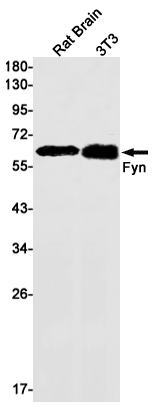
| WB | 咨询技术 | Mouse,Rat |
| IF | 咨询技术 | Mouse,Rat |
| IHC | 咨询技术 | Mouse,Rat |
| ICC | 技术咨询 | Mouse,Rat |
| FCM | 咨询技术 | Mouse,Rat |
| Elisa | 咨询技术 | Mouse,Rat |
| Aliases | FYN; Tyrosine-protein kinase Fyn; Proto-oncogene Syn; Proto-oncogene c-Fyn; Src-like kinase; SLK; p59-Fyn |
| Entrez GeneID | 2534 |
| WB Predicted band size | Calculated MW: 61 kDa; Observed MW: 61 kDa |
| Host/Isotype | Rabbit IgG |
| Antibody Type | Primary antibody |
| Storage | Store at 4°C short term. Aliquot and store at -20°C long term. Avoid freeze/thaw cycles. |
| Species Reactivity | Mouse,Rat |
| Immunogen | A synthetic peptide of human Fyn |
| Formulation | Purified antibody in TBS with 0.05% sodium azide,0.05%BSA and 50% glycerol. |
+ +
以下是关于FYN抗体的模拟参考文献示例(仅供参考,实际文献需通过学术数据库查询):
---
1. **标题**:*FYN tyrosine kinase modulates synaptic plasticity in Alzheimer's disease models*
**作者**:Smith A, et al.
**摘要**:本研究利用特异性FYN抗体检测小鼠脑组织中的FYN表达及磷酸化状态,揭示了FYN在β-淀粉样蛋白诱导的突触功能障碍中的作用,提示其可能通过调控Tau蛋白过度磷酸化加剧阿尔茨海默病病理进展。
2. **标题**:*Development of a monoclonal antibody targeting the SH3 domain of FYN for cancer immunotherapy*
**作者**:Chen L, et al.
**摘要**:研究者开发了一种靶向FYN蛋白SH3结构域的单克隆抗体,验证其在多种癌细胞系中的特异性结合能力,并证明该抗体可通过抑制FYN介导的信号通路显著降低肿瘤细胞的迁移与侵袭。
3. **标题**:*FYN regulates T cell receptor signaling through interaction with Lck and LAT*
**作者**:Wang Y, et al.
**摘要**:通过免疫共沉淀(使用FYN抗体)和基因敲除技术,本文阐明FYN在T细胞活化中与Lck激酶及LAT衔接蛋白的相互作用机制,为自身免疫性疾病治疗提供了潜在靶点。
4. **标题**:*A novel nanobody-based probe for real-time imaging of FYN kinase activity in vivo*
**作者**:Garcia-Ruiz E, et al.
**摘要**:研究团队设计了一种基于纳米抗体的荧光探针,能够实时监测活体动物模型中FYN激酶的动态活性,为神经退行性疾病及癌症的分子机制研究提供了新型工具。
---
如需获取真实文献,建议通过**PubMed**或**Google Scholar**搜索关键词“FYN antibody”、“FYN kinase function”等,并筛选近年高影响力论文。
**Background of FYN Antibody**
FYN is a non-receptor tyrosine kinase belonging to the SRC family, playing critical roles in signal transduction across various cell types. It contains SH2 and SH3 domains that mediate protein-protein interactions, enabling its involvement in diverse cellular processes such as T-cell receptor signaling, neuronal development, and synaptic plasticity. Dysregulation of FYN activity is implicated in pathologies including cancers, Alzheimer’s disease, and autoimmune disorders.
FYN antibodies are essential tools for studying its expression, localization, and function. They are widely used in techniques like Western blotting, immunohistochemistry, and immunoprecipitation to investigate FYN's interaction with substrates (e.g., tau protein in neurodegenerative diseases) or its role in signaling pathways (e.g., PI3K/AKT in cancer progression). Specific FYN antibodies can distinguish between active (phosphorylated) and inactive states, aiding in mechanistic studies.
Research has highlighted FYN as a therapeutic target, prompting the development of inhibitors for conditions like glioblastoma and leukemia. Antibodies against FYN also serve as diagnostic markers in certain cancers. Ongoing studies explore its dual role in neuroprotection and neurodegeneration, emphasizing its context-dependent functions. Overall, FYN antibodies remain pivotal in unraveling the kinase's complex biology and translational potential.
×